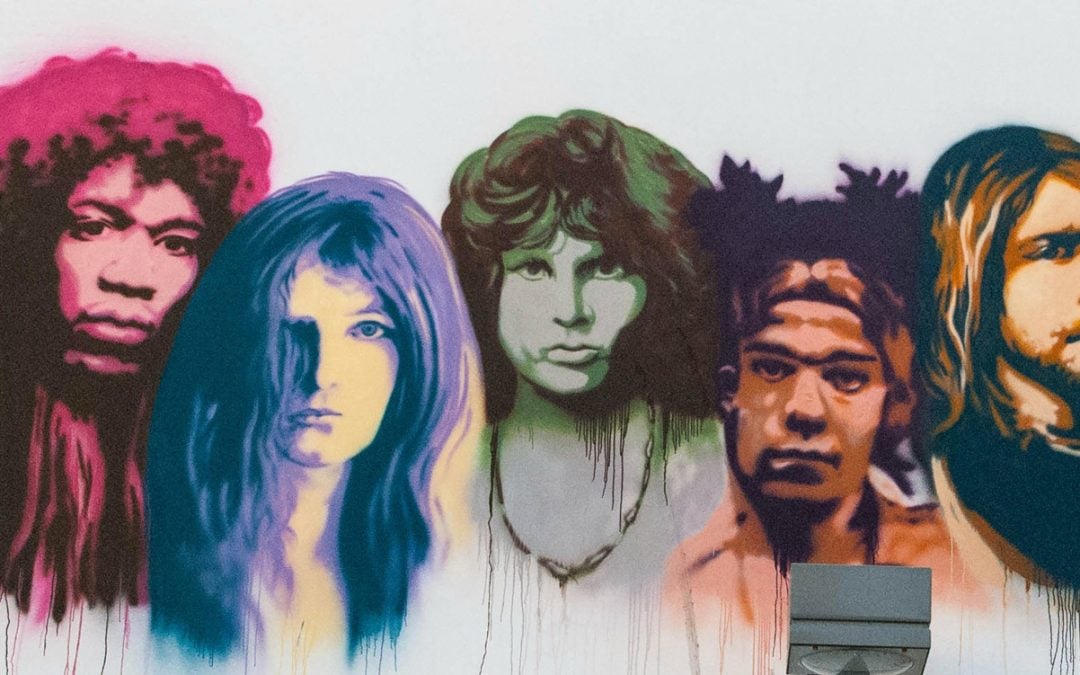The flame that burns twice as bright…
Throughout history, there have been many incredibly talented musicians who died tragically young. While the circumstances of their deaths vary, they all had one thing in common: they were 27 years old when they died. This age has become known as the “27 Club.” While it might sound like something you would want to consider, keep in mind that the prerequisites for inclusion are both fame and premature death.
 Since the 27 Club was first hypothesized in the mid-sixties, many famous artists, actors, and authors have died at that age, with some significant numbers of musicians facing the same fate, particularly in the ten months spanning 1969-1970. Some people say it’s just a coincidence, but others believe there must be a reason for so many artists dying at 27. Is 27 the age when many people reach their creative peak? Could the “rock and roll lifestyle” account for these deaths? If so, what can be done to prevent other young stars from meeting the same fate?
Since the 27 Club was first hypothesized in the mid-sixties, many famous artists, actors, and authors have died at that age, with some significant numbers of musicians facing the same fate, particularly in the ten months spanning 1969-1970. Some people say it’s just a coincidence, but others believe there must be a reason for so many artists dying at 27. Is 27 the age when many people reach their creative peak? Could the “rock and roll lifestyle” account for these deaths? If so, what can be done to prevent other young stars from meeting the same fate?
The flame that burns twice as bright burns half as long. – Lao Tzu
The 27 Club is a term that was first used in an obituary for Brian Jones, a founding member of the Rolling Stones. Jones died at 27 years old from drowning in his swimming pool. Since then, many other famous musicians have also died at 27, including Jimi Hendrix, Janis Joplin, Karen Carpenter, Kurt Cobain, and Amy Winehouse.
The 27 Club is often thought of as a myth and has been debunked in a few studies, but there is some evidence to suggest that there may be something to it. A study of more than 2,000 musicians found that their risk of death was three times higher than the general population. And while most people die from natural causes, many of the 27 Club members died from overdoses, suicides, and accidents.
Too young, too famous, too soon?
So why are so many musicians dying so tragically young? The first notation of a popular musician dying at such a young age dates back to 1938 when the “father of the blues” Robert Johnson died. Some say it’s because they’re living on the edge, always pushing themselves to the limit. Others believe that 27 is simply a cursed age. But whatever the reason, it’s clear that the 27 Club is more than just a coincidence. It’s a tragic reminder of the fragility of life.
 Many young musicians are not prepared for the level of fame and fortune that they achieve. They may not know how to handle the money or the pressure that comes with being in the spotlight. This can lead to problems like drug abuse, anxiety, and depression. In some cases, it can even lead to death. Alcohol, drugs, and the loneliness of the road lead many artists to drink excessively, like Ron “Pigpen” McKernan from the Grateful Dead and Amy Winehouse, who shared the common fate of alcohol poisoning at age 27.
Many young musicians are not prepared for the level of fame and fortune that they achieve. They may not know how to handle the money or the pressure that comes with being in the spotlight. This can lead to problems like drug abuse, anxiety, and depression. In some cases, it can even lead to death. Alcohol, drugs, and the loneliness of the road lead many artists to drink excessively, like Ron “Pigpen” McKernan from the Grateful Dead and Amy Winehouse, who shared the common fate of alcohol poisoning at age 27.
Famous artists are more prone to depression and mental health issues for several reasons.
- They may not have a support system in place to help them deal with the stresses of fame and fortune.
- They may be under a lot of pressure to maintain their level of success.
- They may feel isolated from the rest of the world while on the road and away from family and friends.
- They may be unable to handle the criticism that comes with being in the public eye.
- They may have difficulty dealing with personal relationships.
- They may be suffering from physical or mental health problems that are exacerbated by their lifestyle. Many times these conditions exist as undiagnosed until it’s too late.
For performing musicians, touring can be exhausting, and it’s important to take time to recover between shows. The music industry can become a churn of fast food, long bus rides between shows, sleeping in vans, and enjoying the spoils of their success. On to the next city, rinse and repeat.
I hope I (don’t) die before I get old.
While the 27 Club is tragic and spoken about in hushed tones, it’s important to remember that the artists who died at this age were incredibly talented and left behind a legacy that has inspired other musicians for generations. We remember them mostly for their music and not for their tragic deaths.

Most musicians are aware of the 27 Club, yet find themselves powerless to avoid becoming a part of it. For some, the very idea of dying young becomes a self-fulfilling prophecy. Others may simply be unable to escape the destructive lifestyle that claims so many young lives. It’s also possible they may simply be in the wrong place at the wrong time.
Ironically, Pete Townshend who famously wrote the lyric “I hope I die before I get old” is now comfortably happy this didn’t happen to him, as he eases into his late seventies, still performing around the world as one of the most successful rock performers/composers in the history of popular music.
No assurance of insurance.
Musicians frequently face unique challenges when it comes to health care and insurance. Because they are self-employed, they are not always eligible for traditional health insurance plans. And even if they can get coverage, the costs can be prohibitive.
One way to overcome these obstacles is to join a professional organization like the American Federation of Musicians. The AFM offers health insurance plans specifically designed for musicians and can help with the costs of care.
Resources that can help.
While it is true that many musicians have died young, some available resources can help them live long and healthy lives by making the music they love despite these challenges.
 First, they can reach out to organizations like MusiCares, which provides financial and emotional support to musicians in need. According to their site, “MusiCares helps the humans behind the music because music gives so much to the world. Offering preventive, emergency, and recovery programs, MusiCares is a safety net supporting the health and welfare of the music community.”
First, they can reach out to organizations like MusiCares, which provides financial and emotional support to musicians in need. According to their site, “MusiCares helps the humans behind the music because music gives so much to the world. Offering preventive, emergency, and recovery programs, MusiCares is a safety net supporting the health and welfare of the music community.”
Second, they can seek out counseling or therapy from professionals who understand the unique stresses of their lifestyle. Finally, they can connect with other musicians who have been through similar experiences and can offer advice and support.
While there is no one reason why famous artists are more likely to die young, it is clear that they face unique challenges. With the right support system in place, however, they can overcome these challenges and live long, healthy lives.
Defying the 27 Club
While the 27 Club is often spoken about in hushed tones, it’s important to remember that the artists who died at this age were incredibly talented and left behind a legacy that has inspired other musicians for generations. We remember them not only for their music but also for their tragic deaths.
I think it’s important to note those who have cheated time and are still performing. Many musicians have enjoyed long and successful careers well into their 70s and 80s. Paul McCartney, Mick Jagger/Keith Richards, Pete Townshend, Eric Clapton, Jeff Beck, and Rod Stewart are just a few of the musicians who have lived long and produced amazing music well into their later years.


